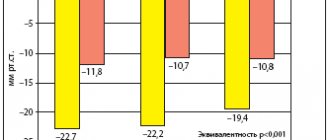Content:
- Is it harmful to drink alcohol with vegetative-vascular dystonia?
- What changes occur in the body 2.1. Alcohol and hypotonic form of VSD
- VSD and alcohol - possible risks 3.1. Panic attacks 3.2. Hangovers and autonomic dysfunction
The main manifestations of vegetative-vascular dystonia (vegetoneurosis) are migraine, tingling in the heart area, changes in blood pressure, weakness and irritability. Alcohol with VSD aggravates the course of the disease, increases the risk of heart attack, stroke, and hypertensive crisis.
What to do to avoid dangerous consequences?
You should not lead to the emergence of such dangerous diseases as cirrhosis, schizophrenia, cancer. The drug treatment clinic “Private Ambulance No. 1” will help you cope with addiction. We provide treatment for alcoholism at any stage. We have modern equipment for diagnostics. We will determine which diseases and disorders are caused by alcoholism, and select treatment, including:
- Withdrawal from binge drinking at home or in a clinic;
- Psychological or medicinal coding;
- Psychological consultations;
- Drug therapy for rapid restoration of internal organs;
- Rehabilitation and post-treatment management of patients.
We will select effective treatment. We employ experienced narcologists, psychologists, and psychotherapists. Treatment involves more than just medication. We strive to completely change a person's view of himself, his life and alcohol. Alcohol should not be high on the list of values. Our specialists will help you get rid of fears, psychological problems, physical addictions, and gain self-confidence.
You can make an appointment with a doctor or call a specialist to your home.
We work around the clock, seven days a week. If you or your loved one feel unwell or have problems due to prolonged drinking, call us at any time. The psychologist will conduct a conversation with the patient, explain the need for treatment, offer options, and motivate. Staying in the hospital will allow you to get a lasting positive result faster. We provide a 3-year guarantee against failure.
Is it harmful to drink alcohol with autonomic dysregulation?
Ethyl alcohol destroys brain neurons and disrupts the mechanism for the synthesis of neurotransmitters, which are responsible for transmitting impulses. The autonomic (autonomic) nervous system cannot normally coordinate the work of internal organs. There are malfunctions in the functioning of the digestive, respiratory systems, heart and blood vessels, problems with thermoregulation. In dystonics, intoxication occurs quickly, and the hangover is severe.
The functioning of the autonomic nervous system is equally negatively affected by strong and low-alcohol drinks.
Consequences for the psyche
Contrary to popular belief that alcohol helps you relax, it is detrimental to the psyche. It is impossible to get rid of depression with its help. The more an alcoholic drinks, the more noticeable the changes for his loved ones:
- Increased irritability and aggression;
- Mood can change suddenly for no reason;
- Apathy increases, interest in everything that is not related to alcohol disappears;
- Mental abilities decrease;
- A person forgets even immediate events, does not remember what he said yesterday;
- Hysterical attacks occur (more often in the weaker sex);
- The social circle is narrowing, only people who drink remain.
An alcoholic violates not only his own psyche, but also the psyche of his child. If a family constantly experiences heavy drinking by parents, conflicts, and quarrels, children develop psychological trauma and the formation of moral qualities is disrupted. A child may feel guilty throughout his life for his parents’ alcoholism or follow in their footsteps because he is used to seeing such behavior.
Over time, mental disorders progress, signs of alcoholic delirium and asthenic neurosis appear. Pathologies can have 2 opposite directions. Some people experience complete apathy and dysphoria. They are unable to experience joy from anything and are constantly depressed. In others, excitability increases greatly and attacks of uncontrolled aggression appear.
Also, do not forget about alcoholic dementia. Alcoholics do not notice how their intellectual abilities decrease and critical thinking is lost. Dementia can reach the point where a person does not recognize himself or his family, and does not understand where he is.
VSD and alcohol: what changes occur in the body
In people with vegetoneurosis, ethyl alcohol aggravates neurocirculatory disorder. Dangerous syndromes develop that can lead to serious complications. Symptoms begin to actively appear 5–6 hours after the feast.
Characteristics of syndromes:
- Cardialgic.
Chest pain and discomfort, increased weakness and fatigue. - Tachycardic.
The heart rhythm is disturbed, the feeling of heat and tremors of the limbs are disturbing. Often there is a sharp jump in blood pressure by 20–30 mmHg. Art. even with slight intoxication. - Bradycardic.
Blood pressure drops sharply, weakness, dizziness, nausea appear, and coordination is impaired. - Arrhythmic.
Blood pressure increases, pulse quickens, breathing slows. A person feels a lump in the throat, a lack of oxygen. - Psychoneurotic.
Unreasonable anxiety, fear, unstable psycho-emotional state.
To get rid of dysregulation of the ANS (vegetative-vascular system), it is necessary to completely stop smoking and drinking alcoholic beverages.
Alcohol and hypotonic form of VSD
Ethanol dilates blood vessels, blood pressure rises. Additionally, your mood improves and you feel more energetic. But all positive changes are temporary. Therefore, with the hypotonic form of the disease, it is allowed to drink alcohol no more than 1-2 times a week, no more than 100 ml. You must first consult with your doctor.
When drinking alcohol excessively, people with hypotension experience heart pain, migraines, and irritability.
A hangover is accompanied by tremors, loss of strength, and nausea.
Consequence groups
The peculiarity of alcoholism is that a person, when faced with the consequences, does not realize how dangerous they are. Often fear for one's life appears only with the first pain or heart attack .
The consequences of chronic alcoholism are divided into several groups:
- Social . An alcoholic destroys connections with family and loved ones. The likelihood of committing a crime and getting injured increases.
- Medical . Ethyl alcohol interferes with the blood circulation of internal organs, causes vasospasm, and increases the risk of developing cancer, heart attack and stroke. Absolutely all systems and organs suffer.
- Mental . Due to central nervous system disorders, alcoholics often experience severe mental disorders. Such consequences can only be eliminated by an experienced specialist, subject to treatment in a hospital.
If you regularly drink alcohol, characteristic external signs will appear. Usually this is swelling, puffiness of the face (especially under the eyes), unstable gait, dull or yellowish skin color. The figure also changes. Men begin to gain weight according to the female type. Fat is deposited in the abdomen, hips, and chest.
The causes of the disease often lie in psychological problems and childhood traumas. A person drinks to forget, but only multiplies his problems. It destroys physical and mental health, family, career, but cannot get rid of depression. Alcohol only increases anxiety and fears, so it is by no means an antidepressant.
Possible risks
Alcohol and VSD of hypertensive and mixed types are incompatible things. When the functions of the nervous system are disrupted, it provokes the development of negative consequences. Patients with vegetative-vascular dystonia quickly develop a harmful addiction.
Consequences:
- tachycardia, arrhythmia;
- a sharp jump in blood pressure, hypertensive crisis;
- stroke;
- heart attack;
- outbursts of aggression;
- kidney and stomach diseases;
- depressive states.
In some concomitant pathologies, drinking alcohol provokes internal bleeding. To reduce the risk of a crisis, alcoholic drinks should be taken with jelly.
This product contains glycine, which improves microcirculation.
Ethanol reacts with drugs prescribed for the treatment of VSD. This leads to the development of pronounced side effects.
Panic attacks
Unreasonable panic attacks are a serious pathological condition, diagnosed in 45–50% of dystonics.
The disease is accompanied by sudden causeless fear and various somatic symptoms. Main manifestations:
- heart rate increases;
- dyspnea;
- compresses the chest;
- increased sweating;
- frequent urination;
- migraine with visual aura;
- muscle tension, numbness of the limbs, tingling in the occipital region;
- dizziness.
With unreasonable panic, concern for life and health arises. During an attack, it is impossible to think rationally, concentrate, or make informed decisions.
An attempt to stop a panic attack with alcohol during vegetative neurosis leads to the development of psychoneurological disorders.
The consequences are prolonged depressive states, isolation, detachment from real life, apathy, suicidal thoughts.
Hangovers and autonomic dysfunction
Often, exacerbation of vegetative neurosis occurs against the background of withdrawal syndrome.
Even if before this the disease was in stable remission. The main manifestations are severe migraine, panic attacks, tachycardia. Due to a significant increase in pressure, you may feel dizzy and faint. The person becomes apathetic or overly excitable. Additionally, there is pain in the abdomen, chest, frequent attacks of nausea and vomiting.
Against the background of a severe hangover, depression develops, panic attacks become regular and intense.
Alcohol is dangerous. Especially with hypertensive and mixed types of disease. Abuse provokes the development of coronary pathology and chronic heart failure.
These diseases lead to disability and death.
Stages of alcoholism
People don't become alcoholics right away. Addiction develops gradually. At first, the patient drinks occasionally, and then loses vigilance, the amount and frequency of alcohol consumption increases. There are 3 stages:
- First . A person periodically experiences a strong desire to relieve stress with the help of alcohol, but this does not happen all the time. There are no symptoms of serious damage to organs or the psyche yet, so everything seems harmless and safe. There are usually no conflicts in the family over alcohol.
- Second . The dosage of drinking increases due to increased tolerance to alcohol. A person can drink a lot and not feel nauseated or very intoxicated, but in the morning he feels very bad due to a hangover.
- Third . The life of an alcoholic comes down to the search for alcohol. He forgets about work, family and strives not to get sober at all. Gets drunk instantly, even with small doses due to damage to liver cells, but never stops after a couple of glasses. A hangover turns into a severe withdrawal syndrome, which can be accompanied by hypertension, incessant vomiting, severe migraines, and insomnia.
Alcohol causes strong physical and psychological dependence, which is very difficult to get rid of on your own. The more a person drinks, the stronger the addiction and the weaker the will. Psychology play a big role . If a person is surrounded only by people who drink, it was customary in his family to drink alcohol constantly, he will do the same in order not to stand out.
Literature:
- Vegetovascular dystonia. Modern view of treatment and prevention / E. B. Bereslavskaya. - St. Petersburg. : Ves, 2005 (GIPC Lenizdat). – 155 s.
- How to help patients diagnosed with vegetative-vascular dystonia? / Veronika Aleksandrovna Golovacheva / 2021 / Consilium Medicum
- Psychosomatic medicine: hands. for doctors / P. I. Sidorov, A. G. Solovyov, I. A. Novikova; edited by P. I. Sidorova. - Moscow: MEDpress-inform, 2006 (M.: Printing house "News"). – 564 p.
Need some advice?
OR CALL A DOCTOR
CALL!
+7
Summarizing
- A small dose of alcohol does help lower blood pressure, but only for a short time. Subsequent drinking will undoubtedly lead to an increase in blood levels and the development of other serious ailments.
- What alcohol increases blood pressure? Any alcohol contains ethanol, which can affect low and high blood pressure.
- Alcohol cannot become a substitute for medication for hypertension and hypotension, as it will lead to the opposite effect and the development of addiction.
- Strong alcoholic drinks cause vasodilation, but then cause spasm and disturbances in the functioning of the cardiovascular system. As a result, a person may suffer a heart attack or stroke.
Therefore, to the question “can you drink alcohol if you have hypertension,” the answer is most likely no.
Effect of alcohol on the heart, arrhythmia, hypertension, alcoholic cardiomyopathy
The direct toxic effect of alcohol on the myocardium plays a decisive role in the development of alcoholic heart damage.
. Thiamine deficiency and the effect of cobalt added to beer as a foaming additive may have a certain significance in the pathogenesis of this cardiomyopathy.
Alcoholic cardiomyopathy
develops more often in men aged 30-35 years who regularly abuse alcohol.
gradually increases
.
Pulse pressure decreases, heart failure appears, primarily in the pulmonary circulation. Tachycardia with ventricular extrasystole
often occurs . After heavy alcohol abuse, transient atrioventricular block may occur.
Transient arterial hypertension
. Developing heart failure in most cases is total. In IHD, left ventricular failure usually precedes right ventricular failure.










